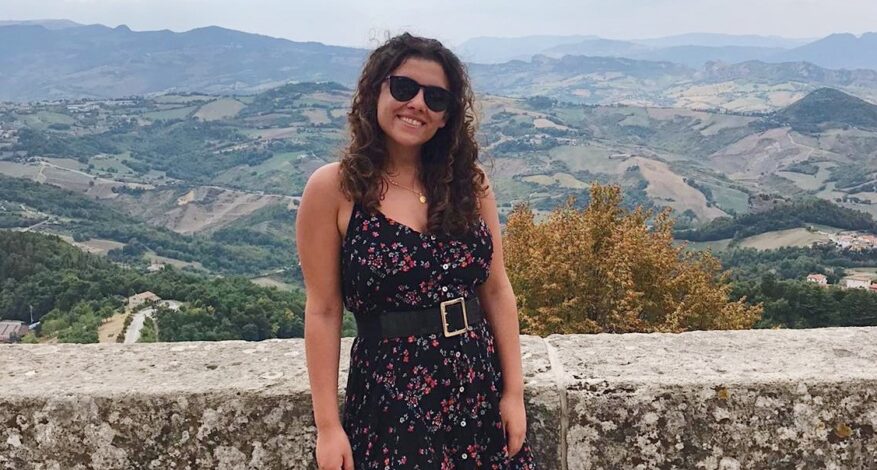ITALIAN AT HEART
Have you ever wondered what it feels like to grow up in a country that does not recognise you as its citizen? How would you feel if there was a big bureaucratic wall between you and who you think you are? Would you feel as you were left out? I am Kejsi Hodo, born in Albania but raised in Italy. Honestly, sometimes I do feel as I was left out and, therefore, very often frustrated. However, let’s start from the beginning.
My story
 My family and I moved to Italy when I was ten. The journey was overwhelming to me, but I was overall happy because I loved the Italian cities I saw on the TV, and I couldn’t wait to finally learn Italian. We arrived in the summer, so we could have some time to adapt and find a school for me and my brother. My parents struggled to get us enrolled, but they eventually made it and I could finally start school in October. And there it was the first setback. I couldn’t speak any Italian and was really behind in maths so, instead of attending the fifth year of elementary school, I had to go back to the fourth year. At first, I was really confused, but later on, I realised my Italian teacher, maestra Lorella, was right – I had an entire year to learn Italian and catch up on maths. My brother and I quickly adapted to our new life and were welcomed by our new classmates, who could not easily communicate with us but made sure we had new friends to play and learn with. To this day, my brother’s best friend is and has always been Gianmarco, the first Italian friend he made, and, as far as I am concerned, some of my closest friends are my elementary school classmates, Rossella, Mingo, and Tommy.
My family and I moved to Italy when I was ten. The journey was overwhelming to me, but I was overall happy because I loved the Italian cities I saw on the TV, and I couldn’t wait to finally learn Italian. We arrived in the summer, so we could have some time to adapt and find a school for me and my brother. My parents struggled to get us enrolled, but they eventually made it and I could finally start school in October. And there it was the first setback. I couldn’t speak any Italian and was really behind in maths so, instead of attending the fifth year of elementary school, I had to go back to the fourth year. At first, I was really confused, but later on, I realised my Italian teacher, maestra Lorella, was right – I had an entire year to learn Italian and catch up on maths. My brother and I quickly adapted to our new life and were welcomed by our new classmates, who could not easily communicate with us but made sure we had new friends to play and learn with. To this day, my brother’s best friend is and has always been Gianmarco, the first Italian friend he made, and, as far as I am concerned, some of my closest friends are my elementary school classmates, Rossella, Mingo, and Tommy.
I am really grateful to my parents for the difficult choice they made, completely changing their lives for their children. It has not come easy to them, because Italian is a difficult language and very often when you do not speak it well, people tend to judge you and treat you differently. In general, people from Bologna, the city we live in, are very friendly and caring, but there will always be someone who has an inherent discriminatory attitude towards foreigners. For my parents, the change has been more difficult, since they still struggle with Italian grammar and vocabulary. This is why I have always helped with the most difficult “enemy” we’ve had to face: bureaucracy. Getting a residency permit in Italy is a long and challenging process, but what really drains you is trying to maintain the documents up-to-date. Since the beginning, I have never liked going to the Immigration Office. The place is quite badly kept and, frankly, most of the officers are impatient and unwelcoming. However, there are also nice people who try to help migrants with their documents. For example, in Bologna, there are Caf and patronati, namely offices where you can get legal help for free. So, we have managed to obtain and keep the necessary documents.
(Not) being an Italian citizen
Having said that, I am now almost 24 and starting to feel the weight of not being Italian, from the legal point of view. In Italy, according to ius sanguinis, you obtain Italian citizenship if one or both of your parents are Italian. Otherwise, you can obtain it by either being born in Italy and applying shortly after your eighteenth birthday, marrying an Italian citizen, or applying for citizenship after ten years of living in Italy continuously. In theory, I fall into the latter category, but some setbacks have come across. First of all, it took us years to obtain the residency permit because of some administrative matters, so, actually, the ten years have not passed yet. Also, it is a very long and expensive process. I hadn’t realised any of this until last year when I started looking for master’s degrees in other European universities. Regardless of where I choose to study, as I am an Albanian citizen, I have to apply for a residency permit, which means I have to legally move to another country, thus losing my years of continuous residency in Italy and, therefore, the possibility to finally become officially Italian.
You may now wonder why becoming an Italian citizen de jure is so important for me. Well, because I am, in fact, Italian. I may not be legally but I grew up in Italy, I love my city and I want to have the right to vote in the place I have spent most of my life in. I do not need a piece of paper to tell me who I am, but I actually need it to have my rights recognised. I have not experienced any discriminatory episodes whatsoever, but I do feel left out. I may be Italian in my mind but I am not in reality. Indeed, I study International and Diplomatic Sciences and am involved in politics, but I cannot vote nor work for the Italian embassies and consulates, which are what I aim at. Additionally, in my opinion, the process you have to go through and the requirements you have to fulfill are redundant. I can apply for residency only when I have spent ten years in Italy, but, at the same time, my income has to be 8,263.31 Euros per year. As the situation stands today, I would not be able to submit the request. What is even more bizarre is the situation of children born in Italy to foreign parents, who can apply for citizenship only after turning 18 (within a year of their birthday) and if they have resided in Italy “legally and continuously” until then. For instance, I have two little cousins, Emili (11) and Jason (almost 1), who were born in Italy. Emili has been to Albania four times and Jason none. Emili understands Albanian but cannot speak it. She goes to school in Italy and is Italian in every aspect you can think of.
Why does she have to wait until her eighteenth birthday to apply for citizenship? Is it really necessary?
Don’t get me wrong, I am extremely grateful for being able to live in such a beautiful country, surrounded by caring people. It’s because of my love for Italy that I want matters to improve these facts to change. I want to thrive in this country and do my best to help it progress.
I am an Italian at heart and I want Italy to recognise that.



